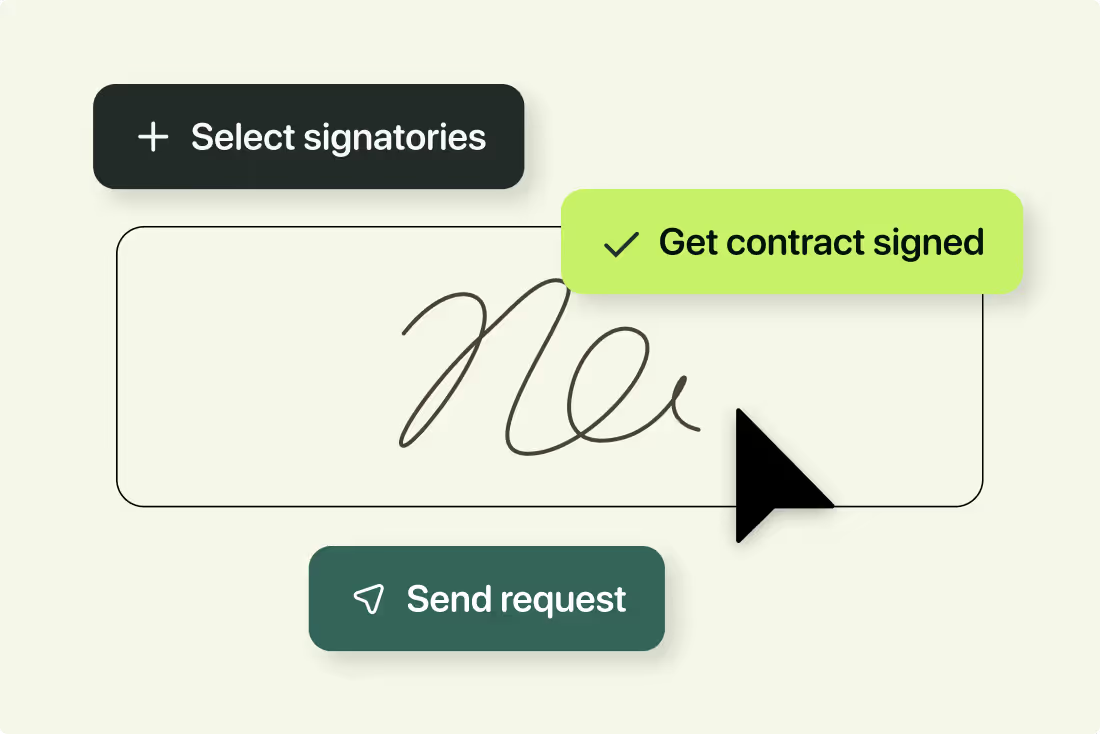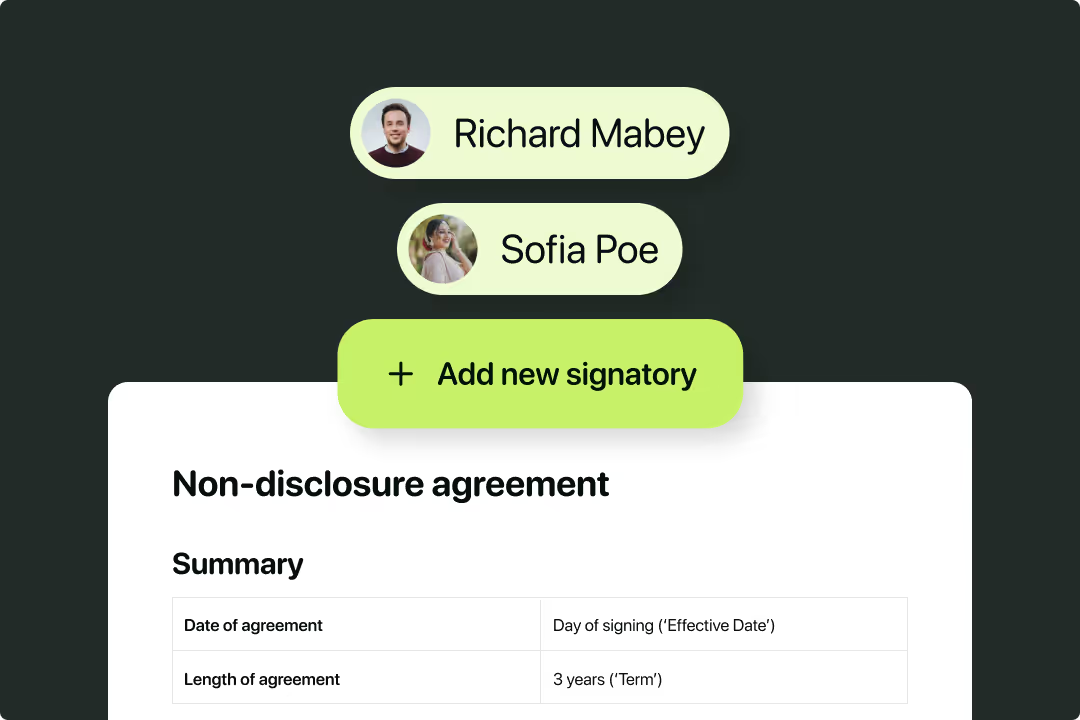Solutions
Customer Support
Resources
While contracts all have certain elements in common, the range in different types of contracts is as broad as the range of companies using them - which, needless to say, is pretty huge.
Contracts that have a large enterprise on one side of the relationship are one such type of contract that deserves special attention.
What are the characteristics of an enterprise contract? How do they differ from other business contracts, what are key elements to note, and how should these contracts be handled? Let’s find out.
An enterprise contract is a binding legal agreement between two parties - one of which is a large enterprise - governing the terms of the deal to which they’re agreeing. Once executed, both parties are bound to honor the conditions of the contract for its duration, or face the potential consequences of breach of contract.
There are lots of different business contracts that might be agreed with an enterprise - everything from multi-year SaaS subscription agreements, to building leases, employment contracts and more.
Large businesses can easily agree thousands of different contracts each year, depending on their business model, which makes enterprise contract management a headache for many companies.
Find out more about contract lifecycle management - or if you’d like to speak to a Juro specialist to learn how to manage contracts at scale, hit the button below.

An enterprise contract is still a contract, so it contains the key elements of contract we would expect - offer, acceptance, consideration and so on. The size of the contracting parties doesn’t affect the need for these core concepts to be present.
However, because an enterprise contract is concerned with a large and powerful company, and perhaps a large contract value too, it’s likely to be different in a couple of significant respects.
Being a large company gives an enterprise increasing bargaining power, which often plays out in its ability to demand amendments from the standard terms that wouldn’t be granted to a smaller company.
Non-standard deviations might be necessary for a smaller company to convince a larger company to do business with them. One example of this might be a SaaS vendor which has a standard term allowing them to reference a new customer by name and include their logo on their website.
For the enterprise, this might involve using intellectual property that normally costs thousands to licence, so the larger company might flex its muscles here to have that clause removed.

Personalization generally is likely to be a key theme in the contract too, both in its drafting and in its negotiation. Many clauses will likely need to be tailored to the larger company’s requirements, for example around data hosting, security commitments and indemnity provisions.
This is why allowing for lengthier contract negotiation is a good idea when contracting with an enterprise. The power imbalance can create friction, so anything that can be done to speed things up (like better contract design, or using browser-based negotiation in order to avoid switching between tools) is a good idea. The last thing you want is to get stuck endlessly redlining PDFs.
It’s fairly common for enterprises to have certain documents they roll out for counterparties on every deal. These might be things like mutual NDAs, DPAs, terms of service, and so on.
Parties contracting with enterprises often have no choice but to sign these documents if they want to partner. For example, a company with the bargaining might of Salesforce doesn’t have much to gain from bending their rules to fit a small company’s needs - they probably have four other vendors waiting in the wings if you can’t get on board.
If you want to partner with larger companies then often the easiest thing to do is to just suck it up - you can review terms next year, but if you want to win the business then dealing with this kind of third-party contract is a fact of life.
It’s worth thinking about certain key elements of an enterprise contract to make sure you’re mindful of the particular requirements of an enterprise counterparty.
Have these been made clear in the drafting of the contract? If the contract is long and complex, it’s a good idea to put key details - like the effective date, duration, monetary values and deliverables - in a table at the top of the contract. Burying details in lengthy clauses will just slow down your time to signature.
If you’re looking for templates to get started with at your business, check out our free non-disclosure agreement template, master services agreement template and offer letter template.
Do you know who the authorized signatory is? You can save time at the end of the deal by making sure you’re clear on who has signatory authority and establishing your lines of communication leading to electronic signature.
In Juro you can simply add them as a signatory and they’ll receive a personalized email prompting them to sign, once the relevant approvals have been given.

Since enterprise contracts are typically more complex and exist in larger volumes, they’re also harder to manage. Even businesses with large legal teams can find themselves buried in low-value contract admin without the right tools in place.
But what does efficient enterprise contract management look like in practice?
Well, enterprise contracts are best managed using a single, comprehensive process or system that creates a single source of truth for contracts and empowers the relevant teams to self-serve on them. Here’s how businesses can do that:
Too many businesses fall at the first hurdle when adopting a CLM system for their enterprise contracts. How? Well, they invest in feature-rich and highly customizable contract management tools that are too complex to adopt across the business. This is a common mistake among those managing enterprise contracts, and one that costs corporations a lot of time and money.
Enterprise-size businesses process a lot of contracts, so they need a process that can meet this demand. One of the most effective ways to manage enterprise contracts at scale is to adopt systems and processes that allow for bulk actions. These will enable legal and business teams to upload, edit, send and sign contracts in large quantities, eliminating the need for repetitive work.
There are a wide range of enterprise contracts that require management, but each in different ways. To ensure that all enterprise contracts are managed quickly and without risk, it’s useful to set up automated contract templates for different contract types and set up conditions within these.
These conditions automate certain processes and empower commercial teams to self-serve on contracts with ease, usually by setting up conditions and pulling data directly into the contract via integrations.
Not only do enterprise contracts need to be created efficiently, they also need to be stored efficiently too. The best way to do this is to use a contract repository that makes contracts accessible to the relevant stakeholders and improves visibility over contracts (and their data) across the business.

Contracts contain vital information that can have huge consequences for your business - so the last thing you want is for a key renewal deadline to be buried in a PDF in a shared drive somewhere.
Manage enterprise contracts in one secure data-rich repository with Juro to help make contracts frictionless and accessible in your business. Get in touch below to find out more.
Lorem ipsum dolor sit amet, consectetur adipiscing elit. Suspendisse varius enim in eros elementum tristique. Duis cursus, mi quis viverra ornare, eros dolor interdum nulla, ut commodo diam libero vitae erat. Aenean faucibus nibh et justo cursus id rutrum lorem imperdiet. Nunc ut sem vitae risus tristique posuere.

